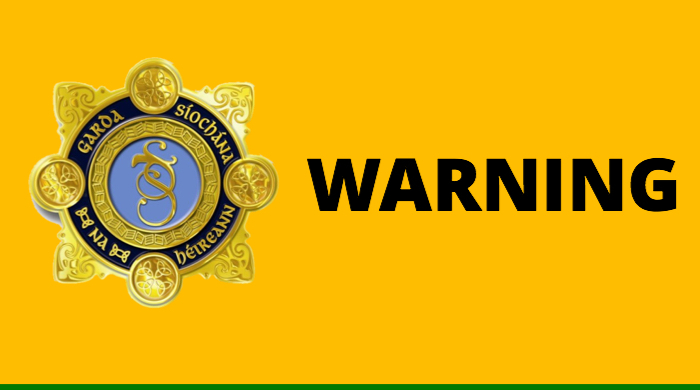Cashel's drivers are warned of new fines introduced today.
Announced by Pascal Donohue this week new fines are being added today to the current offence of driving with worn tyres. The new fines are €80 plus 2 penalty points on your license. If you don't pay you could face 4 points on your license.

The current RSA and Gardaí tyre safety campaign comes on foot of a recent report.
DEFECTIVE TYRES A FACTOR IN 71 ROAD DEATHS BETWEEN 2008 AND 2012
RSA, Minister Donohoe and An Garda Síochána launch major tyre safety awareness campaign
* Landmark report reveals that vehicle factors contributed to 1 in 8 fatal collisions analysed between 2008 and 2012
* 111 people lost their lives and 30 were seriously injured in collisions where vehicle defects were a contributory factor
* Brakes also a factor, contributing to 18 deaths and 6 serious injuries.
A new report from the Road Safety Authority (RSA) has revealed that vehicle factors played a role in 1 in 8 (101) fatal collisions in the period 2008 to 2012. Defective tyres were the most significant factor, representing almost two thirds (64.1% or 66) of all vehicle factors identified. This was revealed at the launch of a landmark new report 'Pre-Crash Report on Vehicle Factors in Fatal Collisions'1, the first of its kind in Ireland, which analysed An Garda Síochána Forensic Collision Investigation reports in order to identify the main contributory factors in collisions on Irish roads. The report was launched today (Monday) by the RSA, the Minister for Transport, Tourism and Sport, Paschal Donohoe TD and An Garda Síochána.
983 fatal collisions occurred on Irish roads between 2008 and 2012, claiming the lives of 1,077 people. The forensic details of 867 fatal collisions were analysed to identify the cause of the collision – of these, 858 involved a motorised vehicle. Vehicle factors, such as defective tyres, brakes, steering or suspension, were found to have contributed to 101 of these fatal collisions, in combination with behavioural factors such as speeding, alcohol or drug use.
Defective tyres were the most significant factor, representing almost two thirds (64.1% or 66) of all vehicle factors identified as contributory to the collision. The report also found that defective brakes were also a contributory factor in road collisions between 2008 and 2012, contributing to 18 deaths and 6 serious injuries in collisions where a vehicle had defective brakes.

The main findings of the report are:
~ Of 858 fatal collisions in Ireland between 2008 and 2012, motorised vehicle factors contributed to 101 collisions (12%)
~ Vehicle factors were a contributory factor in 12% of all collisions. Of these tyres were the main contributory factor accounting for 8%.
~ Of collisions where vehicle factors were noted the condition of tyres accounted for almost two thirds (64.1% or 66) of collisions
~ Defective tyres were more prevalent in single vehicle crashes (74.1%) when compared to multiple vehicle crashes (57.6%)
~ 111 people lost their lives and 30 were seriously injured in collisions where vehicle defects were a contributory factor.
~ 71 people were killed and 19 were seriously injured in a collision where a vehicle had defective tyres as a contributory factor.
~ 18 people were killed and 6 were seriously injured in a collision where a vehicle had defective brakes
~? 17-24 year old drivers accounted for almost half (47%) of fatal collisions involving defective, worn, over or underinflated tyres
~ The highest proportion of drivers with defective tyres were in Donegal (18.2%), followed by Cork, Kerry and Wexford (9.1% each)
~ Losing control on a bend on a regional road and on a road surface that was dry at the time were typical scenarios noted in the investigation reports.
Minister for Transport, Tourism and Sport, Paschal Donohoe TD, said: "This report highlights just how important it is that every aspect of a vehicle, whether a car, truck, van or motorcycle, is in proper, roadworthy condition. None of us can predict what will happen when we use the roads – we may encounter other drivers behaving poorly, or weather conditions could be particularly bad. But we can take personal responsibility for ensuring our vehicle is properly maintained so that we can rely on our tyres responding to the conditions as they should or our brakes working when they need to. To highlight how critical this is to our safety on the roads, work is currently on-going to bring the offence of defective and non-roadworthy tyres within the penalty point system. So I would urge people to take preventative measures by checking their vehicles regularly and ensure they are roadworthy."
The report also found that over half (51.5%) of the tyres on the 66 vehicles with defective tyres were excessively or dangerously worn and 10.6% were underinflated, some dangerously low. 6% were a combination of excessively worn, underinflated, the wrong size or fitted in the wrong direction.
The RSA and An Garda Síochána are advising road-users to get their tyres checked regularly at Irish Tyre Industry Association (ITIA) and SIMI-registered garages and give themselves the peace of mind that their tyres are roadworthy.
Ms. Moyagh Murdock, Chief Executive of the Road Safety Authority said: "This report shows that tyres are the parts of your car that are most likely to put you at risk of a fatal collision if they're not roadworthy."
She added, "Don't assume you can tell if there's a problem just by looking at them – you can't. I would strongly recommend that you check your tyres at least once a month. The easiest way to do this is to call into your local garage and get your tyres checked by an expert. Most will probably do this free of charge. When purchasing tyres, invest in tyres that will last and I would urge people not to purchase used tyres, you just can't be sure of their history and will cost you more in the long run."
Chief Superintendent Aidan Reid, An Garda Síochána said, "Tyres are the only part of your vehicle that keep you in contact with the road so it is critical that they are in roadworthy condition at all times. Your safety, along with the safety of your passengers and other road users, could depend directly on the condition of your vehicle's tyres. If your tyres are worn, under or over-inflated, the wrong size, or damaged in any way, they won't respond properly in an emergency, or poor weather conditions. Our advice to road-users is to get your tyres checked regularly and ensure they are properly maintained or they could fail you when you need them most."
A recent survey of driver behaviour conducted by Behaviour & Attitudes for the RSA found that over half (53%) of drivers surveyed had experienced problems with their tyres in the past five years. Even more worryingly, one third of drivers had experienced such problems while driving. This was more pronounced among those who drive on major roads, drive for work or are aged 34 or younger. This is despite 82% of drivers stating that they know how to check the air pressure in their tyres and 73% stating they know how to check the tread depth.
Concluding Ms Murdock said "Every driver has a personal responsibility to ensure that the vehicle they are driving is in a roadworthy condition. This means conducting regular walk around checks on the vehicle before a journey to spot obvious issues like broken lights, worn tyres and worn windscreen wipers. It also means ensuring your vehicle is serviced regularly by a qualified mechanic, this should be at least twice a year, with one a general health check and one a more detailed check."
To date this year, 43 people have been killed on Irish roads. This is an increase of 5 road deaths on the same period last year.
1 Pre-Crash Report on Vehicle Factors in Fatal Collisions, 2008-2012
2 Behaviour and Attitudes Survey, conducted in November 2015, on a sample of 1073
Notes:
Table 1: Vehicle Factors as a Contributory Factor all Motorised Vehicle Collisions
N | % | |
Tyres | 66 | 7.7 |
Brakes | 14 | 1.6 |
Steering | 3 | 0.3 |
Suspension | 3 | 0.3 |
Stolen/U.T. Vehicle | 1 | 0.1 |
Windows - Vision Obscured | 1 | 0.1 |
Other | 13 | 1.5 |
None | 757 | 88.2 |
Total | 858 | 100.0 |
The RSA has the following dos and don'ts for motorists:
Choose the right tyres
Choose tyres that are right for the vehicle and the type of driving you do. Talk to a tyre specialist to get advice on the tyres you need. Most tyre manufacturers recommend placing the tyres with the best grip at the rear of the vehicle. Fitting tyres with less grip at the rear of your vehicle can cause over-steer and loss of control. Correctly balanced wheels will ensure smooth and vibration-free drive which will also extend your car's suspension and steering components.
Check the tyre depth
Make sure the tyre has plenty of thread and is above the legal limit of 1.6mm, check around the whole circumference of the tyre. The tyre is the only part of the vehicle that is in contact with the road. The more thread you have, the greater grip the vehicle has on the road and the safer you'll be. All tyres have tread-depth indicators set into them that are at a depth of 1.6mm. Use this block to see if the tyre has worn to the same level or lower. It is easy to check your tyre depth. The RSA has a handy pop up gauge that can assist you or call into a local garage and get help. Remember to check the depth in different locations on the tyre.
Keep your tyre at the correct tyre pressure
Tyres naturally lose air pressure over time so it's worth checking your tyres every month. Having the correct tyre pressure helps improve safety, car handling and fuel consumption. You can find your correct tyre pressure on the inside of the fuel door or in the vehicle's handbook. Don't forget about the spare wheel or space saver – make sure they are inflated to the correct pressure too.
Use Space-savers tyres only in an emergency
Keep space saver tyres inflated to the pressure indicated on the wheel label and only use over short distances to get your car to a tyre repair centre. Don't drive more than 80km/hr and be prepared for the car handling to be different when one is fitted on your vehicle.
Replacing tyres
If your tyre has come into contact with a solid object, such as pothole and/or you have noticed uneven wear on your tyre, please go to a tyre specialist to have it examined. Your wheel and axles need to be fully aligned to ensure safe driving and that the car is handling correctly. You may need to replace the tyre. When deciding what new tyre to purchase, please don't make that decision purely on budget and make sure safety is paramount to your decision making. Car manufacturers recommend that replacement tyres be the same type as those originally fitted to maintain all-round driving performance. Part worn tyres have been previously used and you do not know the road history which that tyre has travelled. Please consider carefully whether you are getting real value for money. In some cases, you would have to buy three sets of part worn tyres in order to get the same life as a new set of tyres.
For information on tyre safety, download 'Your Guide to Tyre Safety' from the RSA website











Be the first to leave a comment.